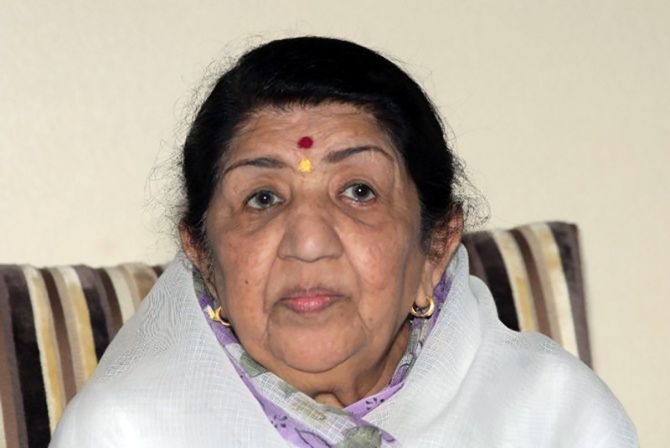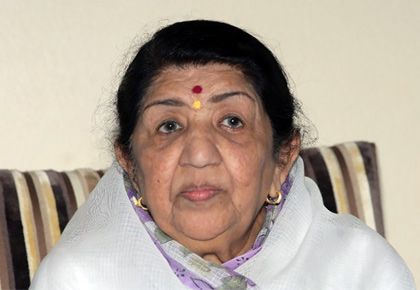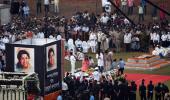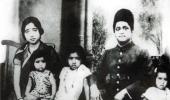'She had shown some signs of improvement, but then she went into multi-organ failure.'

Her smile is a Mona Lisa smile, it's priceless, Lata Mangeshkar's doctor Dr Pratit Samdani said, finding it difficult to talk about the legendary singer and his much loved patient in the past tense.
A day after Mangeshkar died in Mumbai's Breach Candy hospital and was cremated with State honours, her treating doctor recalled her charismatic smile, her connect with the hospital staff and his family, her innate grace and his deep sadness and sense of personal loss.
"She had two private sisters (nurses) and she loved the hospital sisters too. My doctors and the entire team are in love with her," Dr Samdani told PTI.
Dr Samdani said he relates her 'golden voice to her charismatic smile.'
"Her smile is a Mona Lisa smile. It is a priceless smile," he said, adding that it will always stay with him.
The smile had an instant effect on the staff too.
"If she would smile, we would be really happy. We would be more active. We would wait for her to smile. She would smile when she would find an incident which was funny," he added.
Dr Samdani, who has treated several celebrities over the years at the hospital, has a special spot for Mangeshkar.
"She is iconic, very tolerant to all therapies. She is very patient, inquisitive, and never refused any therapy. She has been an excellent patient. As a human being, she has shown so much affection, respect to all of us," he said, lapsing into present tense ever so often as he remembered his association with his 92-year-old patient.
For millions of fans, February 6, was the day the music died. And for him too.
Dr Samdani, who announced Mangeshkar's death to the world, saying she passed away at 8.12 am due to multi organ failure 'after over 28 days of COVID-19 diagnosis', described the day as extremely difficult.
"She had shown some signs of improvement, but then she went into multi-organ failure. Whenever any patient's multiple organs start deteriorating, it is always a tough journey. We had to support every organ that required the support. It was extremely difficult to see her deteriorate," he said.
"It is deeply saddening and a personal loss for all of us. It was difficult to break it to the family, but the family was aware that things are not looking good."
Dr Samdani recalled his first meeting with Mangeshkar in November 2019. She was wheeled into the hospital late at night and was admitted to the ICU after she complained of difficulty in breathing.
"Just to see Didi, (I) got goosebumps when I got to know that I was going to be treating her and after examining her to know that she is so critical, it was not only emotionally difficult but a big challenge.
"Even though she was sick, she was keenly observing me, how I was talking or communicating to her. She wanted to make sure she had confidence in me when I started treating her. The moment it was done, she said, 'Doctor whatever you want, I don't have any problem'."
In the more than two years since, their relationship changed and they grew closer, the doctor said.
Whenever they met on video calls, she would also also talk to his eight-year-old daughter Ishanvi and his nephrologist wife Ruchi.
"We had a personal relationship. She loves my daughter," he said.
Mangeshkar would send letters to Ishanvi. Her favourite song was O Paalan Haare from Lagaan and Didi would ask her to sing it.
"Didi had told her that you sing well and that she would put her on her YouTube channel," Samdani said.
The video calls would happen once a week due to the pandemic and he would meet her whenever required.
"We wanted to make sure she doesn't get exposed to COVID-19," he added.
But destiny had other plans.
On January 8, Mangeshkar was admitted to the hospital after she tested positive for the novel coronavirus with mild symptoms.
Whenever she would be brought to the hospital, the hospital staff would play her songs, particularly her bhajans.
"We used to put her music on, which would essentially be bhajans, like that of Ganpati shlokas, Maha Mruntunjay, among others. She was very receptive. She knew it was her voice," the doctor said.












 © 2025
© 2025